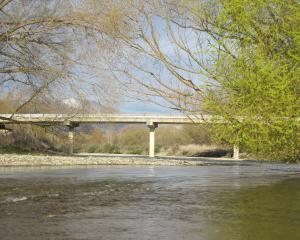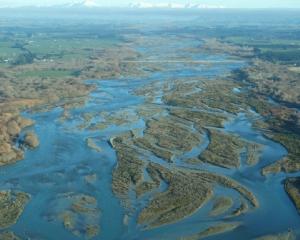Mr Cadogan made his position clear when question time turned into a debate with the 6A plan change panel when the hearing resumed in Dunedin yesterday.
"It is untenable that there will be a double standard, consequently there could only be a similar standard, 6A will flow on to 6B," he said.
Panel chairman Duncan Butcher said while the policies and objectives of 6A might flow on, there was no indication of what the rules for 6B urban water quality might be.
However, the four territorial authorities represented at the hearing yesterday - Dunedin city, Clutha district, Waitaki district and Central Otago district - believed the standards set in 6A would provide the basis for 6B.
Mr Cadogan said if the district was to meet standards suggested in 6A, ratepayers would face even higher costs than they did now for infrastructure upgrades already completed.
"I am not now going to stand up in front of those communities and tell them to take another huge hit for no reason."
He was concerned 6A would negatively affect his district's major industries, farming and forestry, as some farmers would struggle to meet the standards consistently, he said.
"I fear, even with best practice, farmers will still go bankrupt over this. It's a step too far."
Dunedin Mayor Dave Cull said his overwhelming concern was that the plan change "plays divide and rule".
"The urban community thinks it can smugly sit back and let the farmers worry about plan change 6A, but their turn is next.
"By the time Otago's towns and cities wake up, the policies and standards that will apply to urban discharges as well will be already set. That is not fair."
He called for the approach to water quality to be integrated and allow the community to balance the variety of values that water held.
"The city does not want to be put in the position of arguing for a special regime for urban discharges that is more permissive than for rural non-point source discharges. This is politically untenable and unreasonable."
Central Otago District Council acting infrastructure manager Peter Morton, presenting Mayor Tony Lepper's submission, said the approach was "just unfair" and would mean major increases in costs for new sewerage systems, that might not even meet the indicated standards.
"This leaves the council stuck between a rock and hard place ..."
Waitaki District Council Deputy Mayor Jim Hopkins said the major problem with the standards was the ambiguity and uncertainties in what the proposed regulations meant.
If more funding had to go to resolving consents for roading works, it left less to carry out the actual works, resulting in a drop in service, he said.
The group's environmental scientist Susan Bennett said the rules could impose unnecessary constraints on activities within the region for minimal environmental gain, so a catchment-based approach would be more appropriate.
While the proposed water quality standards were not stringent enough to prevent degradation of water quality, the discharge standards were too tough and only a few people would be able to comply with them, she said. She believed discharges from tile drains would not comply with 6A rules and most farmers would be required to seek consent for their existing and future discharges.
"This defeats the intent of PC6A which was to allow most farmers to operate without interference from the regional council."
The group's resource planner, Frances Lojkine, said the uncertainty and confusion that would result from the plan change would mean there was a significant risk to the overall aim of achieving good water quality.
It was highly likely targets and standards for water quality and discharges would be used to evaluate and manage urban discharges by default, she said.
In her opinion the prohibited activity rules in the plan should be removed and a more workable and effective solution found.
The hearing continues in Dunedin today.
Day 4
Where: Dunedin.
Panel: Crs Duncan Butcher (chairman), David Shepherd and independent member Clive Geddes.
Proposal: Changes to Otago's water regulations to prevent run-off in rural areas polluting the region's waterways.
Submitters: Mosgiel Taieri Community Board, counsels Phil Page and Bridget Irving, Dunedin Mayor Dave Cull, Cr Andrew Noone, Waitaki deputy mayor Jim Hopkins, Clutha Mayor Bryan Cadogan, Central Otago District Council acting manager infrastructure Peter Morton, environmental scientist Susan Bennett, resource planner Frances Lojkine.
Quote of day: "The rules and limits established by PC6A are inappropriate and unachievable."- Resource planner Frances Lojkine
Advertisement





